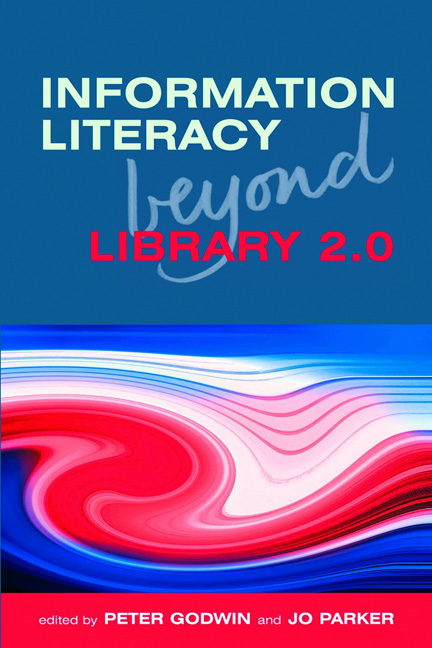Book contents
- Frontmatter
- Contents
- Contributors
- Acknowledgements
- Introduction
- PART 1 RECENT DEVELOPMENTS IN INFORMATION LITERACY AND LIBRARY 2.0
- PART 2 CASE STUDIES
- 7 Reinventing information literacy at UTS Library
- 8 Using games as treatments and creative triggers: a promising strategy for information literacy
- 9 Changing the conversation: introducing information literacy to a generation of smartphone users
- 10 Tweets, texts and trees
- 11 Referencing in a 2.0 world
- 12 Moving information literacy beyond Library 2.0: multimedia, multi-device, point-of-need screencasts via the ANimated Tutorial Sharing Project
- 13 Informed cyberlearning: a case study
- 14 An online course on social media for student librarians: teaching the information skills and literacies of social media
- 15 Transliteracy and teaching what they know
- 16 ANCIL: a new curriculum for information literacy: case study
- 17 TeachMeet: librarians learning from each other
- PART 3 WHAT IT MEANS FOR INFORMATION PROFESSIONALS
- Index
16 - ANCIL: a new curriculum for information literacy: case study
from PART 2 - CASE STUDIES
Published online by Cambridge University Press: 09 June 2018
- Frontmatter
- Contents
- Contributors
- Acknowledgements
- Introduction
- PART 1 RECENT DEVELOPMENTS IN INFORMATION LITERACY AND LIBRARY 2.0
- PART 2 CASE STUDIES
- 7 Reinventing information literacy at UTS Library
- 8 Using games as treatments and creative triggers: a promising strategy for information literacy
- 9 Changing the conversation: introducing information literacy to a generation of smartphone users
- 10 Tweets, texts and trees
- 11 Referencing in a 2.0 world
- 12 Moving information literacy beyond Library 2.0: multimedia, multi-device, point-of-need screencasts via the ANimated Tutorial Sharing Project
- 13 Informed cyberlearning: a case study
- 14 An online course on social media for student librarians: teaching the information skills and literacies of social media
- 15 Transliteracy and teaching what they know
- 16 ANCIL: a new curriculum for information literacy: case study
- 17 TeachMeet: librarians learning from each other
- PART 3 WHAT IT MEANS FOR INFORMATION PROFESSIONALS
- Index
Summary
You have learned something. That always feels at first as if you had lost something.
(H. G. Wells)Introduction
Recent research suggests that the information-seeking behaviour and needs of students are changing (CIBER/UCL, 2008; SCONUL, 2011 among others), driven largely by the changing experiences and expectations of ‘the Google generation’, who have grown up with access to the internet being the norm. While the Google generation and ‘digital native’ terms have been debated and widely criticized (Jones et al., 2010), it is clear that information literacy programmes over the next five years will need to adapt and respond to the needs of current students.
This case study describes a short project based at Cambridge University Library and funded by the Arcadia Programme (http://arcadiaproject. lib.cam.ac.uk), a three-year initiative designed to explore the role of academic libraries in the digital age. The project ran from May until July 2011 and sought to develop a practical curriculum for information literacy that meets the needs of the undergraduate student entering higher education over the next five years.
A new curriculum for information literacy: project overview
Aims and objectives
The project sought to develop a practical curriculum for information literacy that meets the needs of the undergraduate student entering higher education over the next five years. Specifically, the project aimed:
• to understand the information needs of future undergraduate students on entering higher education
• to develop a revolutionary curriculum for information literacy that could be used with undergraduate students entering UK higher education
• to provide practical guidance about how best to equip students with the knowledge, skills and behaviours, in terms of information use, to support their learning in the digital age
• to develop a flexible curriculum that could be used and adapted in the higher education community and used in face-to-face, blended and online learning provision.
Methodology
The authors carried out an extensive review of the literature, which forms the theoretical background to this project. A modified Delphi study was undertaken which involved consulting widely with experts in the information and education communities. The curriculum was developed and presented to the expert group and took into account findings from the literature and from the expert consultation. It was subsequently refined and a final curriculum, with a number of supporting documents, was produced.
- Type
- Chapter
- Information
- Information Literacy Beyond Library 2.0 , pp. 171 - 190Publisher: FacetPrint publication year: 2012
- 1
- Cited by



